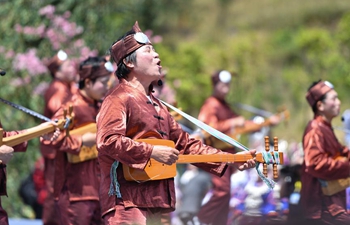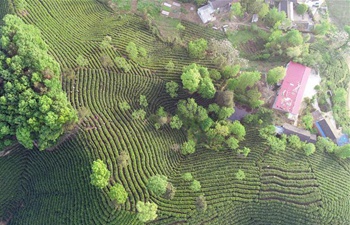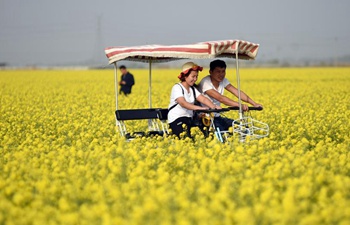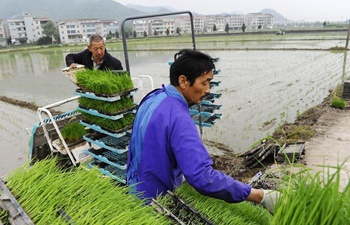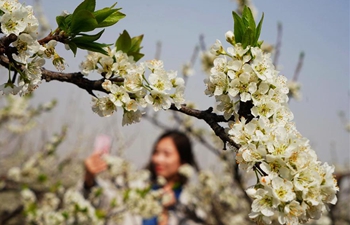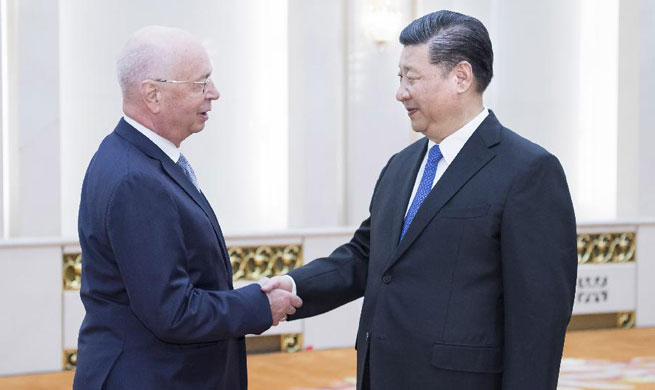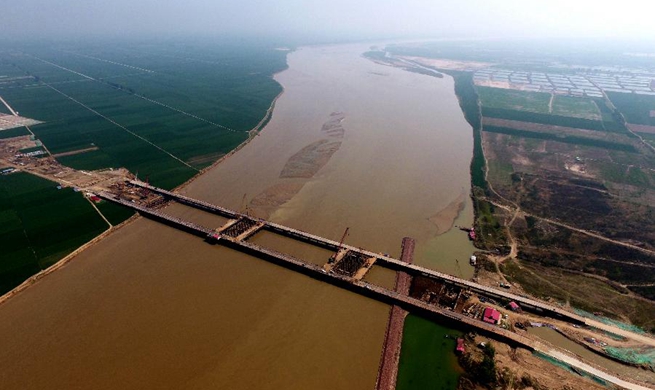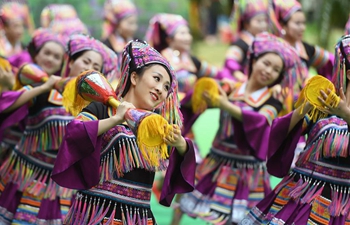BAGHDAD, April 17 (Xinhua) -- Colorful billboards and posters of all sizes have flooded major streets in Iraqi cities, signaling the start of a month-long campaigning for the first parliamentary election since the anti-terror victory.
As Iraqis are poised to cast their votes on May 12, the Iraqi Independent Electoral Commission set April 14 as the date for nearly 7,000 candidates to kick off their campaigning to compete for 329 seats of the next parliament.
This will be the first parliamentary election in Iraq held since the defeat of the militant group Islamic State (IS) late last year.
In the very early hours on Saturday, hundreds of campaign workers flocked to the streets across Baghdad, to put up campaign posters, banners and billboards for the candidates.
Within hours, most of the major streets in the Iraqi capital were covered by a variety of campaign posters and portraits of candidates from different political parties.
The posters and banners, usually featuring candidates' portraits, all promise a better future if the candidate wins the race.
One billboard reads "To secure our future," with a large portrait of the incumbent Shiite Prime Minister Haider al-Abadi, who was dressed in military uniform.
Another billboard reads "It Is Iraq's Time," with a picture of Hadi al-Ameri, head of al-Fateh, or Conquest Alliance, which is an umbrella group of paramilitary Shiite militias of Hashd Shaabi who fought IS with the government forces.
In the past days, the number of campaign billboards, banners and posters has significantly increased, sometimes leading to quarreling between campaign workers for different candidates.
Ahmed Sa'id, a government employee, told Xinhua that he witnessed a brawl between two groups of campaign workers on a cross bridge in western Baghdad as they were competing to find space to erect campaign posters for their own candidates.
"They argued first before they fought with hands until the police intervened to end the quarrel," Sa'id said.
Saad Ahmed, owner of a convenient store in Jamia district in western Baghdad, told Xinhua the competition between some candidates reached to the degree that their supporters tore up each other's posters.
"I saw a number of young people tearing up the posters and portraits of a competing candidate by knives," Ahmed said.
Many Iraqis lament the corruption and incompetency among the political elite during the years of their governing Iraq since 2003. They accuse them of being behind the woes of Iraqis.
"You, miserable parties, you have taken a share of our blood. Leave us, and stay away of us, wherever you want. Just don't live with us, you corrupt officials," shouted a resident in Tahrir Square in downtown Baghdad as he was beating some portraits of candidates with his hand and shoe.
Isam Abdullah, an unemployed young man, told Xinhua that he has lost confidence in the electoral process, saying the upcoming polls will not bring about a change.
"I won't vote, because we're fed up with lies. Voting again is shameful," Abdullah said.
Other Iraqis, like college student Mohammed Salman, called on Iraqi citizens to actively take part in the election in order to vote for independent candidates to bring in new faces in the political scene.
"I hope there will be a real chance for a change, if we all hand in hand cast for replacement of old politicians, who failed to serve our people, in order to bring independent candidates," Salman said.
The upcoming election is like "war for existence, either to make a change to get comprehensive reforms, or the same corrupt people will bring the country to further chaos and bloodshed," Salman added.
In a statement on his website, the influential Shiite cleric Moqtada al-Sadr called on all Iraqis to participate in the upcoming election to defeat the corrupt people.
Sadr said that he himself would boycott the election if it is a comprehensive boycott by the people of Iraq, but adding that it would be impossible to get such boycott.
About 6,986 candidates, including 2,014 women, will compete for the 329 parliamentary seats to form a new government which will rule Iraq for the next four years.
Iraq's previous general election was held on April 30, 2014, when the Iraqis elected 328 lawmakers for the parliament.




